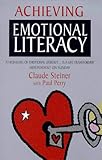 Category: Psychotherapy.
Category: Psychotherapy.
Target audience: General. Great for individuals and for couples who want to communicate better.
How challenging is it to read? Straight forward. No previous knowledge assumed.
Ok, I’ll Admit it from the start of this review, I’m a bit of a Claude Steiner groupie! If you have had therapy with me, you’ll know I talk about him a great deal. I think Steiner has some great theories and enjoy his larger than life personality and outspoken ideas. As you will pick up in this review, I love his emotional literacy stuff and encourage my clients to become emotionally literate because I am sure it brings improvement to relationships and increases feelings of self worth. I will be blogging about emotional literacy in more detail for sure!
If you’re not sure who Claude Steiner is, he one of the foremost figures in the development of TA. He trained with and was a good friend of Eric Berne, the founder of TA, and had a major influence on TA basic concepts, especially the theory of script formation and strokes.
The aim of “Achieving Emotional Literacy” is to teach you to do exactly that! This is a handbook to teach you to accept your emotions and take responsibility for the impact that your behaviour has on the emotions of others. After a brief introduction the book splits into three stages. Stage one is “Opening the heart”; Stage two “Surveying the Emotional Landscape” and Stage three “Taking Responsibility”. But before I describe what’s in each section I think it’s important to describe what Steiner means by Emotional Literacy.
Steiner puts it thus:
“To be emotionally literate is to be able to handle emotions in a way that improves your personal power and improves the quality of life around you. Emotional Literacy improves relationships, creates loving possibilities between people, makes cooperative work possible, and facilitates the feeling of community.” Steiner p11
Step one of the book “Opening the Heart”, talks in detail about strokes and the stroke economy. Strokes are an important concept in TA and are defined as “A unit of recognition”. That could be through conversation with another, physical contact or even a smile. Strokes are important to all of us and as a species we seek them out voraciously. Steiner explains how to give, recieve and reject strokes appropriately. He emphasises the need for honesty in relationships and discusses how we are all intuitive and will the spot the lies or half truths other people tell us. When we lie to others it will be picked up on some level and will damage our relationships. Steiner also explains why self stroking, confronting that negative parental voice that tells us that we are no good, is so important if we want to be happy, healthy individuals.
Step two of the book entitled “Surveying the Emotional Landscape” goes into detail about how to talk about our emotions to others in a safe and caring way whilst also inviting others to meet our needs. Intuition is discussed in detail and he also relates the best way of talking about the “hunches” we have with others.
Step three, “Taking Responsibility” is mainly about how to give and receive apologies. Saying sorry is very important when we make mistakes. It repairs damage and lets the other party know they are valued and respected. Steiner takes us through the right way and wrong way of doing this.
There then follows brief chapters on using emotional literacy with children, in the work place and a chapter on personal power and how being emotionally literate allows us to be powerful without the need for power plays or violence.
So why do i recommend this book so highly? It’s because Emotional Literacy is such an important part of forming relationships with ourselves and others. When we are in relationships with others it’s key that we are able to explain our wants and needs without being judgmental of them or assuming we know what they want or why they behaved in a certain way towards us. Steiner explains all of this clearly and gives practical advice on how to achieve this.
I love Steiner’s ideas about the stroke economy, especially as it rings so true. I can see how the rules of the stroke economy restrict us in the way we may relate to others, and perhaps more importantly, the way we see ourselves. I’m sure most of us have had experiences where some one we care about can say lots of nice things to us and we barely notice yet the second they say one negative thing it hits home hard. That’s the stroke economy in action!
It’s not always easy for any of us to truly feel safe enough to show our emotions. This book takes us through it in stages and encourages us to realise that those that are truly strong are in touch with their emotions and know themselves well.
The bad news is that the book I have reviewed costs £60 new (at the time of writing) if you click my amazon link above. The good news? This book: Emotional Literacy: Intelligence with a Heart, is an updated version published in 2003 and retails for around £10. Want the even better than good news? Steiner has a great website, and a history of giving away his books for free, so you can actually read this book for nought pence! So now you have no excuse not to read one of the best books out there on leading a happy balanced life. Enjoy!
